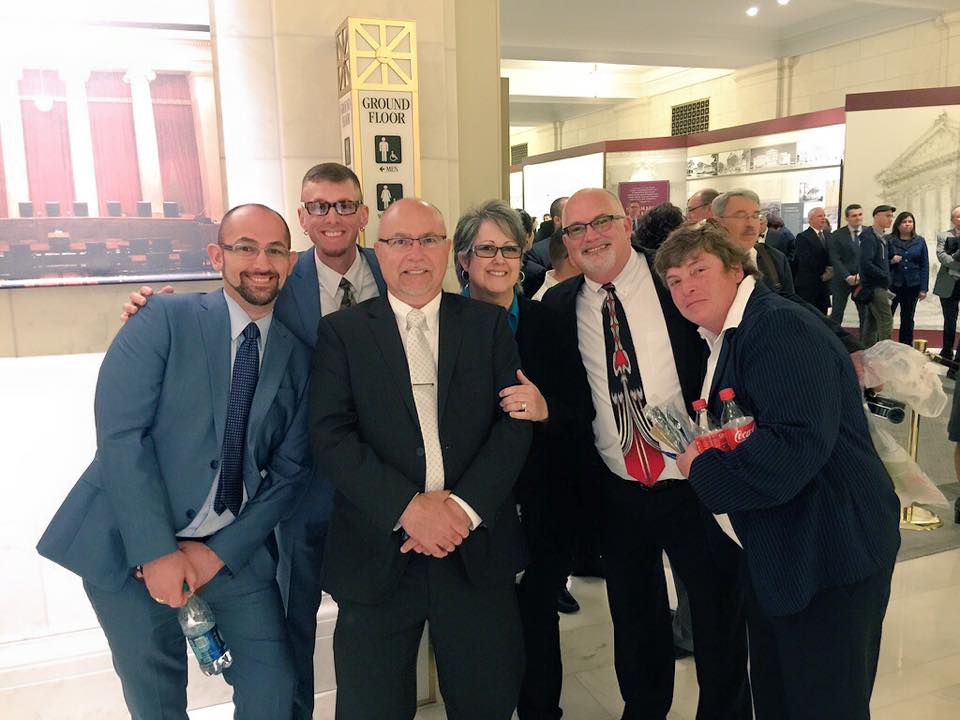By Bob Allen
The U.S. Supreme Court heard oral arguments April 28 about whether the 14th Amendment requires a state to license a marriage between two people of the same sex and, if not, whether states that forbid gay marriage must recognize lawful same-sex marriages performed out of state.
Supreme Court justices appeared divided during 90 minutes of arguments in Obergefell v. Hodges, a case challenging Ohio’s ban on same-sex marriage consolidated with three other cases challenging similar bans in Kentucky, Michigan and Tennessee. Justice Anthony Kennedy, expected to cast the pivotal vote, asked hard questions on both sides.
“This case isn’t about how to define marriage,” said John Bursch, special assistant attorney general for the state of Michigan. “It’s about who gets to decide that question. Is it the people acting through the democratic process, or is it the federal courts?”
Boston attorney Mary Bonauto, arguing on behalf of same-sex couples seeking the right to wed, countered that “in terms of the question of who decides, it’s not about the court versus the states.”
“It’s about the individual making the choice to marry and with whom to marry, not the government,” she said.
Donald Verrilli, solicitor general for the U.S. Department of Justice, argued that “in a world in which gay and lesbian couples live openly as our neighbors, they raise their children side by side with the rest of us, they contribute fully as members of the community, that it is simply untenable to suggest that they can be denied the right of equal participation in an institution of marriage, or that they can be required to wait until the majority decides that it is ready to treat gay and lesbian people as equals.”
 “Gay and lesbian people are equal,” Verrilli said. “They deserve equal protection of the laws, and they deserve it now.”
“Gay and lesbian people are equal,” Verrilli said. “They deserve equal protection of the laws, and they deserve it now.”
Washington, D.C., lawyer Douglas Hallward-Driemeier spoke on behalf of clients who are already married, arguing “a state should not be allowed to effectively dissolve that marriage without a sufficiently important justification to do so.”
“These petitioners have built their lives around their marriages, including bringing children into their families, just as opposite-sex couples have done,” said Hallward-Driemeier. “But the non-recognition laws undermine the stability of these families, though the states purport to support just such stability.”
Joseph Whalen, associate solicitor general in Nashville, Tenn., argued the 14th Amendment “does not require states with traditional marriage laws to recognize marriages from other states between two persons of the same sex.”
Parties in the case include Maurice “Bojangles” Blanchard, an ordained Baptist minister who volunteers with an LGBT-outreach program at Highland Baptist Church in Louisville, Ky., and local gay-rights activist opposing laws in Kentucky limiting marriage to a union between a man and a woman.
Blanchard tweeted from the Supreme Court building that while the questioning was tough, he remains optimistic that a ruling expected to be handed down in June will come down on the side of marriage equality.
Bursch said nobody questions that the couples in the case who are raising children “are bonded to their kids and have their best interest at heart,” but the larger issue in redefining who can get married is the long-range impact on the institution of marriage.
“Imagine a world today where we had no marriage at all,” he said. “Men and women would still be getting together and creating children, but they wouldn’t be attached to each other in any social institution.”
“Now, the marriage view on the other side here is that marriage is all about love and commitment,” Bursch said. “As a society, we can agree that that’s important, but the state doesn’t have any interest in that.”
Bursch said the state’s interest in marriage is not to foster love and emotion but about “binding children to their biological moms and dads.”
“If you’re changing the meaning of marriage from one where it’s based on that biological bond to one where it’s based on emotional commitment, then adults could think, rightly, that this relationship is more about adults and not about the kids,” he said.
Hallward-Driemeier said Kentucky’s assertion that its interest in permitting only opposite-sex couples to marry is only to increase the birthrate makes no sense when applied to same-sex couples who are already wed.
“Kentucky would have the court believe that it is a sufficiently important interest to have that couple disregard their existing marriage vows and obligations to each other to marry someone else in Kentucky in order to procreate biologically even though the couple may already have children together,” he said. “That, I would dare say, is not a rational justification, much less a sufficiently important one.”
Conservative justices questioned the wisdom of changing the understanding of marriage between a male and female that has been the norm for 1,000 years.
Associate Justice Ruth Bader Ginsburg said the legal definition of marriage was already changed from “a relationship of a dominant male to a subordinate female,” when the Supreme Court struck down Louisiana’s “head and master” law in 1981.
Associate Justice Stephen Breyer wondered if the real reason states ban gay marriage is because certain religious groups do think it’s a sin.
“I believe they sincerely think it,” Breyer said. “There’s no question about their sincerity, but is a purely religious reason on the part of some people sufficient?”
Previous stories:
Supreme Court brief argues for gay Baptist minister’s right to wed
Baptist minister’s case for gay marriage going to Supreme Court
Latest gay marriage ruling, which involved Baptist plaintiff, could hasten Supreme Court decision
Court considers gay marriage arguments affecting four states
